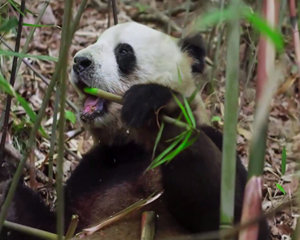Many animals that live amongst the frozen peaks have, over thousands of years, become adapted to meet the challenges of a high-altitude existence.
许多在冰冻山峰上生活的动物在数千年来已经适应了这样的环境,来应对高海拔生活的挑战。
But now their world is changing... because of global warming.
但因为全球变暖,现在它们的世界正在改变。
Ice that has remained frozen deep within mountain glaciers is starting to melt, accelerating their movement.
在山上冰河中保持冻结的冰已经开始融化,加速了它们的移动。
Over the three years that it took to film this series,
在拍摄这季节目超过三年的时间里,
the quelccaya icecap, 5,500 metres up in the Peruvian andes, has receded by a staggering 60 metres.
位于秘鲁安地斯山脉海拔5500米的奎尔卡亚冰帽已经缩减了惊人的60米。
In Europe, some alpine glaciers are now shrinking by 100 metres a year.
在欧洲,一些高山冰河现在已经以每年100米的速度缩小。
One of them, the sankt annafirn glacier in Switzerland, has almost completely disappeared.
它们之中,瑞士的圣安纳菲尔冰河,已经几乎完全消失。
Most of the others are expected to have followed it by the turn of the century.
其他大部分冰河也预期会在本世纪内消失。
The warming of the frozen slopes could threaten the life of perhaps the most famous mountain resident of all.
冰冻山坡的暖化可能会威胁到大概是世界上最有名的高山住民的生活。
Hidden within the bamboo forests of western China... is a hot and bothered male giant panda.
隐藏在西部中国的竹林中,是一只又热又烦躁的雄性大熊猫。
He has spent the winter sheltering lower down the valley.
它在较低洼的谷地避过了冬季。
Now it's early summer, and his thick coat that protected him throughout the winter has become very uncomfortable.
而现在是初夏,保护它度过了冬天的厚毛皮现在却变得很不舒服。
He needs to reach the cold of the higher slopes.
它必须到更高的冷山坡上。
But before he can start the ascent, he needs a good meal to give him the necessary energy.
但在它开始爬山之前,它必须好好吃一顿来提供必要的能量。

Giant pandas eat almost nothing except bamboo.
大熊猫几乎不吃竹子外的食物。
But bamboo is so low in calories that he needs to spend ten hours a day eating.
但竹子的热量很低,它每天必须花十小时进食。
With breakfast over, he begins his climb to higher ground.
吃完了早餐,它开始爬向高地.
But in no time at all... He's hungry again.
但没爬多久,它又饿了。
This is going to be a long journey. And it may be an even longer one in the near future.
这会是很长的旅程。而不远的未来这旅程可能还会更长。
As climate change raises the temperature in these mountains,
随着气候变迁,这些山里的气温升高,
giant pandas may well need to climb higher and higher to find cooler conditions.
大熊猫可能必须要越爬越高来找到更冷的环境。
But the cold-loving bamboo they most favour cannot move so easily.
而它们爱吃的喜欢较冷环境的竹子却不容易移动。
And may disappear from the warmer lower slopes altogether.
竹林可能会从较低、较温暖的山坡消失。
So far, these snow-covered peaks continue to provide this male with enough space to feed and find a mate...
目前,这些白雪覆盖的山峰,持续提供这只雄性大熊猫足够的空间觅食和求偶。
So he scent-marks his territory.
它在地盘上留下气味标记。
Panda-style -- with a handstand.
熊猫风格,用双手站立。
It may well be that in the next few decades the mountains of the world will warm.
很可能在接下来的数十年内世界上的山区都会变暖。
Should that happen, many species will inevitably disappear.
如果发生了,很多物种都会无可避免地消失。
But we should never forget the versatility and endurance of the animals that have succeeded in colonising these icy islands in the sky.
但我们永远不能忘记这些曾经成功生存在这些空中冰冻岛屿的动物的多样性和耐力。



